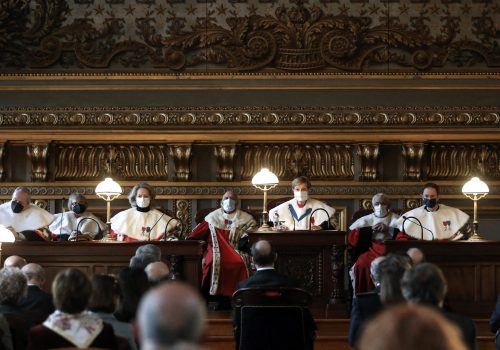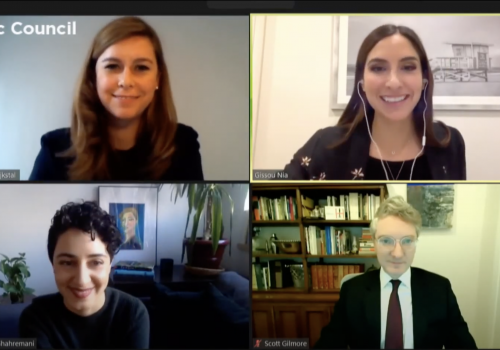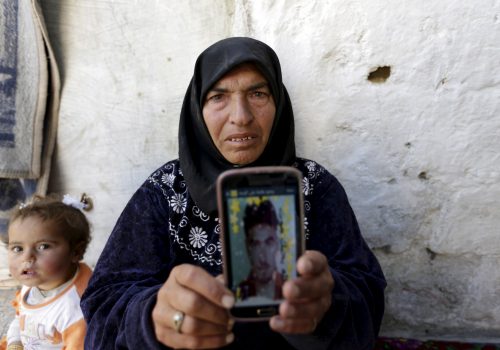Action must be taken to award reparations to victims of Russian war crimes
In the wake of Russia’s invasion of Ukraine on February 24, the United States, United Kingdom (UK), European Union (EU), and other countries unleashed a flood of targeted sanctions designating Russian oligarchs, freezing their assets, and banning them from obtaining visas. Oligarchs—wealthy business leaders who often built fortunes through proximity to the Russian state—are believed to provide resources to the Russian government for the illegal invasion and to hold power within Russia. By freezing the assets of oligarchs, sanctions hinder their ability to do the former while incentivizing them to use the latter to help end the war.
Since levying these sanctions, Western leaders have proposed escalating these measures by seizing the assets frozen under sanctions. UK Secretary Michael Gove has suggested using oligarchs’ London properties for “humanitarian purposes,” while the US Department of Justice established a new “KleptoCapture” Task Force. Italy, Spain, Switzerland, and France have reportedly already seized several villas and yachts, and a slew of journalists and open-source researchers have begun to track and publish the locations and ownerships of other yachts, private jets, and luxury apartments, identifying assets across the globe. This represents a notable uptick in efforts to locate and freeze the well-protected assets of the Russian elite, many of whom have availed themselves of complex multijurisdictional structures to anonymize assets and avoid the bite of sanctions. Some proposals have even been mooted to use these assets to fund reparations for the victims of this tragic war.
Victims of human rights violations and atrocity crimes have a right to truth, justice, and reparations. Reparations, or redress for the irreparable harm inflicted by such violations, frequently take the form of monetary compensation paid out of perpetrators’ funds. They are desperately needed not only for the Ukrainians enduring the Russian invasion, but also for the victims and survivors of Russia’s ongoing campaign in Syria.
Syria has served as a “testing ground” for Russian warfare during its eleven-year civil war and experts are now looking to Syria to predict how the current invasion will progress. Yet, despite several ongoing legal processes, Syrians continue to face hurdles in securing meaningful reparations, including the evasiveness of complicit Russian actors. While there have been trials across Europe for Syria under the principle of universal jurisdiction, these trials haven’t featured significant damage awards. So far, it seems that justice efforts for Ukraine will also include universal jurisdiction cases, as Sweden, Germany, and Spain have both begun investigations, and may face the same barriers. The International Criminal Court has also opened an investigation into crimes committed in Ukraine—an option repeatedly denied for Syria—and has the power to award reparations, but it has historically faced difficulties in implementing them.
The calls to target oligarchs’ assets for reparations appear to offer hope of supplementing these existing legal efforts with opportunities to secure substantial reparations. However, the actions thus far don’t match the tough rhetoric and such proposals should be viewed with caution.
Many oligarchs remain untouched by sanctions
London is a particular hotspot for oligarchs, with an estimated £1.5 billion ($1.9 billion) in property owned by Russians linked to the Kremlin or accused of corruption. However, despite recent UK sanctions, many Russians with UK assets have been able to avoid their effects.. Some oligarchs have been designated by the US long ago and have already found ways to operate through structures not vulnerable to sanctions. Meanwhile, other wealthy Russians started moving their wealth to countries less likely to impose sanctions ahead of the recent tranches of designations. In the past several weeks, twenty-five private planes belonging to sensitive business figures landed in Tel Aviv, a “large exodus” of private jets flew to Dubai, and several superyachts were stationed in the Maldives. Israeli Foreign Minister Yair Lapid has promised to prevent oligarchs from using Israel as a route to bypass sanctions and, while some oligarchs have left, many hold Israeli passports and banks haven’t been given clear government directives on handling sanctioned individuals’ funds. As more sanctions come, oligarchs will continue to restructure and reshuffle so that practical asset freezes remain limited.
UK oligarch designations have minimal impact and are subject to legal challenges
The UK has designated a significant number of individuals and entities in relation to Russia. However, Russian oligarchs are notoriously litigious, which will require the UK government to have robust legal backing for all designations—especially those levied on private businesspeople who will contest their links to the atrocities. Further, the UK has already shown that it’s unwilling to fully threaten its dominant-haven status for foreign high-net-worth individuals and has made efforts to soften the blow of designations by allowing carveouts such as the license for a thirty-day “wind down period” before VTB Bank sanctions take effect. This delay allows time for asset flight, as almost happened—and may still happen—with oligarch Roman Abramovich’s attempted sale of Chelsea Football Club. While the UK will feel the need to be seen taking action in the face of horrific images and videos appearing out of Ukraine—and to show that it is taking brave and unprecedented steps against Russian interests—it’s likely to implement these in ways that minimize the scope of their potential impact on the British economy.
Asset freezes don’t guarantee asset seizures
There is an enormous legal gulf between temporarily restricting property and altogether reassigning its ownership. As seen in other sanctioned states—notably Iran, Libya, and Sudan—some countries have vast sums frozen for years and have citizens with meritorious claims, but their funds have largely not been reapportioned. The European Court of Justice has held that sanctioned assets cannot be automatically reassigned to creditors, even when there is a final and enforceable judgment. Instead, the decision needs to be granted by national authorities and, hence, is politically loaded. Additionally, oligarchs’ wealth is privately owned, either personally or through companies, which would make legal seizure difficult.
Any legal route to seize the assets would need to be through the relevant legal systems of the countries involved, likely requiring proving liability through lengthy and expensive litigation. Even new legislation being developed specifically for this situation, such as the “Asset Seizure for Ukraine Reconstruction Act” in the US, is subject to the practical difficulties of tracking down assets, establishing ownership, and meeting the requisite legal thresholds.
Not all hope is lost, however. The consensus around the need to repurpose assets as reparations should be applauded, and officials are already making efforts to strengthen the UK’s actions. The following policies can push forward the goal of securing reparations without sacrificing defendants’ rights:
- States should commit to levying targeted sanctions on relevant actors involved in Russia’s atrocities, including in Syria. To that end, states should welcome input and seek advice from NGOs and experts. They should also commit to providing full transparency around the effects of targeted sanctions; for example, by publishing detailed information around the assets frozen under relevant regimes.
- States must coordinate multilateral sanctions designations to minimize evasion.
- States must provide sufficient funding to governmental departments in charge of levying and enforcing sanctions to adequately prepare for and defend against litigation.
- States must refrain from allowing non-essential carveouts to targeted sanctions designations, such as those created by granting licenses that would allow for asset flight before sanctions take effect, as in the case of the VTB Bank wind-down license and (potentially) the Chelsea Football Club sale, which would undermine the effects of designations.
- States should adopt legislation, such as that proposed in Canada, which establishes a legal avenue to seize and repurpose assets frozen under any human rights and corruption-related sanctioning authorities (regardless of the country context) as reparations for the relevant crimes. This will provide efficient legal processes and protect defendants’ rights during these processes.
- All policies to freeze, seize, and repurpose Russian oligarchs’ assets as reparations must explicitly include provisions related to Syrian victims of Russian violations to ensure reparations are distributed equitably among different victim groups, and so that victims of the identical aggressor can be treated equally.
The possibility of awarding reparations to victims of Russian aggression would provide a glimmer of light for global justice and accountability advocates. However, the steps taken to further these goals must be strategic and coordinated across continents, especially as they will lay the groundwork for similar actions in other conflicts. The international community is overdue for an overhaul of the legal tools accessible to victims of state-sponsored crimes in the twenty-first century. Perhaps justice mechanisms for Ukraine and Syria can stymie such impunity once and for all.
Jomana Qaddour is a resident senior fellow with the Rafik Hariri Center and Middle East Programs, where she leads the Syria project.
Celeste Kmiotek is a staff lawyer with the Strategic Litigation Project at the Rafik Hariri Center and Middle East Programs.
Further reading
Thu, Feb 10, 2022
A perpetrator of Syrian crimes against humanity went free in France. Here’s why it shouldn’t happen again
MENASource By Michel Duclos
If the scope for changing the course of events in Syria is limited, it’s honorable to take a stand against the abominable crimes of the Bashar al-Assad regime. It would be a great pity for France to be seen as a safe haven for Assad’s accomplices.
Mon, Dec 21, 2020
Global litigation strategies to close the accountability gap on human rights violators in Iran
MENASource By
Gissou Nia and a panel of litigators—Haydee Dijkstal, Amanda Ghahremani, Scott Gilmore—discussed the tools through which the perpetrators of gross human rights violations in the Islamic Republic of Iran (IRI) can be held accountable in the United States, Europe, and Canada.
Tue, Oct 6, 2020
I survived Assad’s torture—here’s why I’m a proud advocate of the Caesar Act
MENASource By
The Caesar Act is not the solution, but an important tool that the US and the international community must use alongside others to end the killing in my homeland.
Image: FILE PHOTO: Eclipse, a superyacht linked to sanctioned Russian oligarch Roman Abramovich, is docked in the Turkish tourist resort of Marmaris, Turkey March 22, 2022. REUTERS


